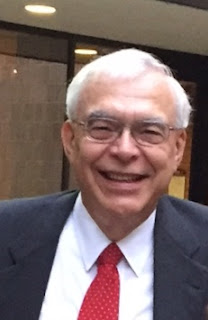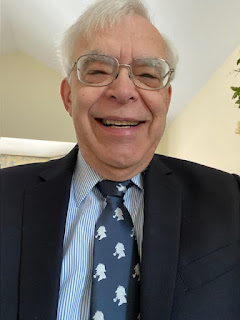If you've been anywhere around Sherlockiana over the past few years, you've seen the name Rich Krisciunas. He started popping up in a bunch of Zoom meetings during Covid and seemed like a nice guy. Turns out, that's not an act. Rich has been to plenty of Sherlockian gatherings once the world opened back up and everyone who's met him, myself included, agree that he is a joy to spend time with.
And Rich's work pops up all over the place! He's active in his local scion, is resurrecting another, and was just published in a recent issue of The Baker Street Journal. He runs the John H. Watson Society's annual treasure hunt. He gives a monthly presentation on law at the Crew of the Barque Lone Star Zoom meetings. He is one of the founding members of The Legion of Zoom. He presented at Holmes in the Heartland. And if a scion society is hosting a meeting online, you can count on him being there and contributing to the discussion. Did I forget something? Probably. There's no keeping up with this guy. But you can get to know him a little better in this week's interview!
How do you define the word “Sherlockian”?
I’m a simple guy. I look at a “Sherlockian” as anyone who enjoys any facet of Sherlock Holmes from the Canon, pastiches, movies, to any TV series and who is part of our community.
How did you become a Sherlockian?
I was introduced to Sherlock Holmes in the early 60’s when a local TV station showed the Basil Rathbone and Nigel Bruce movies. I loved his deductions. I don’t recall reading the stories because I mostly read stuff about baseball.
In the 1970’s, my wife bought me the Annotated Sherlock Holmes for Christmas and she gave me a different Sherlock Holmes book every year that I read during the Christmas break. One year it was Nicholas Meyer’s The Seven-Percent-Solution, another year Loren D. Estleman’s Sherlock Holmes versus Dracula or The Adventures of the Sanguinary Count.
I had a framed Hound of the Baskervilles movie poster that I hung in my office and another lawyer saw it and invited me to a meeting of The Amateur Mendicant Society of Detroit. I attended several meetings and enjoyed the camaraderie playing The Game but had to drop out after I was promoted to a special unit where I tried only First Degree Murder cases and didn’t have time for recreational reading.
After I retired from the active practice of law, I discovered that the Mendicants were still meeting and there were three other societies in Michigan. I began attending their meetings and rekindled my love for the Canon. I hate to admit it but because of the Covid pandemic, I was able to attend numerous virtual meetings each week and made Sherlockian friends I never would have met.
What is your profession and does that affect how you enjoy being a Sherlockian?
I am a lawyer and have been involved in criminal law for 48 years. I joined the Wayne County Prosecutor’s Office in Detroit after graduation in 1975. After retiring as the Chief of the Trial Division in 2004, I was hired, full-time, by my alma mater, the University of Detroit, where I have taught Trial Practice as an adjunct professor since 1983. I began defending court-appointed clients so I could take my students to court with me. I did that for 12 years and handled a couple thousand cases. Currently, I work as a city attorney at a local district court, six minutes from my house, one morning a week.
I’ve found a niche doing Sherlockian Law 101 for the Crew of the Barque Lone Star every month. When I read the canon, I always think about how I would prosecute or defend the people Holmes suspected of crimes. Which witnesses could testify? What evidence would be admissible? What would I argue to a jury? I have enjoyed writing articles and making presentations about prosecuting Sherlock Holmes and defending people like Beppo, Adelbert Gruner and Captain James Clayton.
What is your favorite canonical story?
Charles Augustus Milverton. “The worst man in London.” Blackmail. Holmes disguised as a plumber. Engaged! Poor Agatha. Holmes deciding to commit a burglary. Loyal Watson refusing to let Holmes do it alone. Milverton isn’t asleep and both are trapped. The surprise shooting of Milverton. Holmes’ refusal to help Lestrade. “My sympathies are with the criminals.” Holmes playing with Lestrade, “My, it might be a description of Watson.” The most fun for me was writing a paper proving that a “regal and stately lady” didn’t kill Milverton but the real shooter was, actually, Sherlock Holmes.
Who is a specific Sherlockian that you think others would find interesting?
I can’t limit it to one. Without a doubt, it’s Bob Katz, Paul Thomas Miller and Mike McSwiggin. They all influenced and inspired me and made me laugh whenever they did a presentation. They all came up with clever and unique perspectives that no one had thought of before.
For years, I read writings about the writings that were serious and then I heard their presentations. They were thoroughly researched, plausible and funny, and it hit me to think about what hasn’t been done before. Katz’s paper on Dr. Watson being at Gettysburg when he was a youth inspired me to look at everything in the Canon differently. Miller’s blog, The Shingle of Southsea is brilliant. They inspired me to write things like the disgusting and despicable Baren Adelbert Gruner was, simply, “The Most Misunderstood Man in the Canon.”
What subset of Sherlockiana really interests you?
I love the legal aspects in the stories. I like to read the writings about the writings and I love the BSI Professional Series like Canon Law and Nerve and Knowledge. Whenever I read a canonical story, I enjoy going down rabbit holes after finding something that intrigues me or I don’t understand. I love finding the back stories in every adventure. Thank goodness for the Internet. For instance, when I read about doctors Palmer and Pritchard, the “first of criminals,” in "Speckled Band," I researched who they were and who they poisoned so I could do a presentation at my local scions or on Zoom for other groups.
Your monthly presentations on Sherlockian Law 101 are always fun and informative. How do you juggle the differences in British vs. American law?
Thank you and thanks to Steve Mason and the Crew of the Barque Lone Star for inviting me to present. American law is based largely on the Common Law of England so there are not a lot of differences. Thanks to the Internet and the University of Detroit Mercy School of Law library, I have access to law books and legal search engines that enable me to read old law review articles, statutes and court cases from the nineteenth century.
I’ve enjoyed doing legal research since I attended law school in the 70’s so it’s all fun and not work at all. Being retired, if I’m not golfing or watching hockey, I’m doing legal research for Sherlockian Law 101 or some future Sherlockian presentation on Zoom or for my local scions, like the Ribston-Pippins.
How do you go about preparing the John H. Watson Society's treasure hunt? That seems like a HUGE undertaking!
OMG How did I ever think volunteering to do the treasure hunt was a good idea? It’s like running a marathon. I start at the beginning of each new year. I try to come up with a topic and do the research for that set of questions. I complete one set every month. One funny thing is that no matter how thorough I think my preparation has been, I am always surprised when someone comes up with an answer I didn’t anticipate and I have to give credit for the answer.
What book would you recommend to other Sherlockians?
I really like two volume set The Grand Game for the historical perspective on the stories and Mattias Bostrom’s “From Holmes to Sherlock” so you can see what was going on in Conan Doyle’s life during the time he was writing certain stories.
Where do you see Sherlockiana in 5 or 10 years from now?
I hope I’m still around to see it. We need to figure out a way to attract more people, especially younger readers, to attend society meetings in person or virtually on Zoom, and to subscribe to publications like The Baker Street Journal, Sherlock Holmes Review, Canadian Holmes and Sherlock’s Spotlight.
I’m worried about the future as most of us are getting older. There’s a scion in Michigan that’s been around since 1946 that stopped meeting in person after the pandemic began. I contacted its 45 members and am trying to resuscitate the group but only a dozen have agreed to attend a future meeting. I see a lot of the same faces at various conferences and virtual meetings on Zoom. Will we be able to attract new people and younger readers into our community?
I would anticipate more movies and TV programs because the character, Sherlock Holmes, has so much appeal. He is unique and clever and sees things that others can’t. I anticipate more pastiches because there are more people writing stories but are they being read? Everyone is being pulled in different directions. We need to make it convenient to attend meetings virtually. As a member of the Legion of Zoom, I have attended over 600 meetings of over 30 different societies and met people from around the world. Hopefully, the future will include larger virtual groups.
I know people like to meet in-person and socialize, but it is sad that a great presentation at an in-person meeting of the Parallel Case of St. Louis or Speckled Band of Boston is seen only by that group’s members and then is lost and never seen again by other Sherlockians around the world. We need to find a way to capture the presentations and make them available online to other Sherlockians who can watch it at their convenience. How many people are out there who don’t live near a scion and can’t attend an in-person meeting but would love to see these presentations?





No comments:
Post a Comment